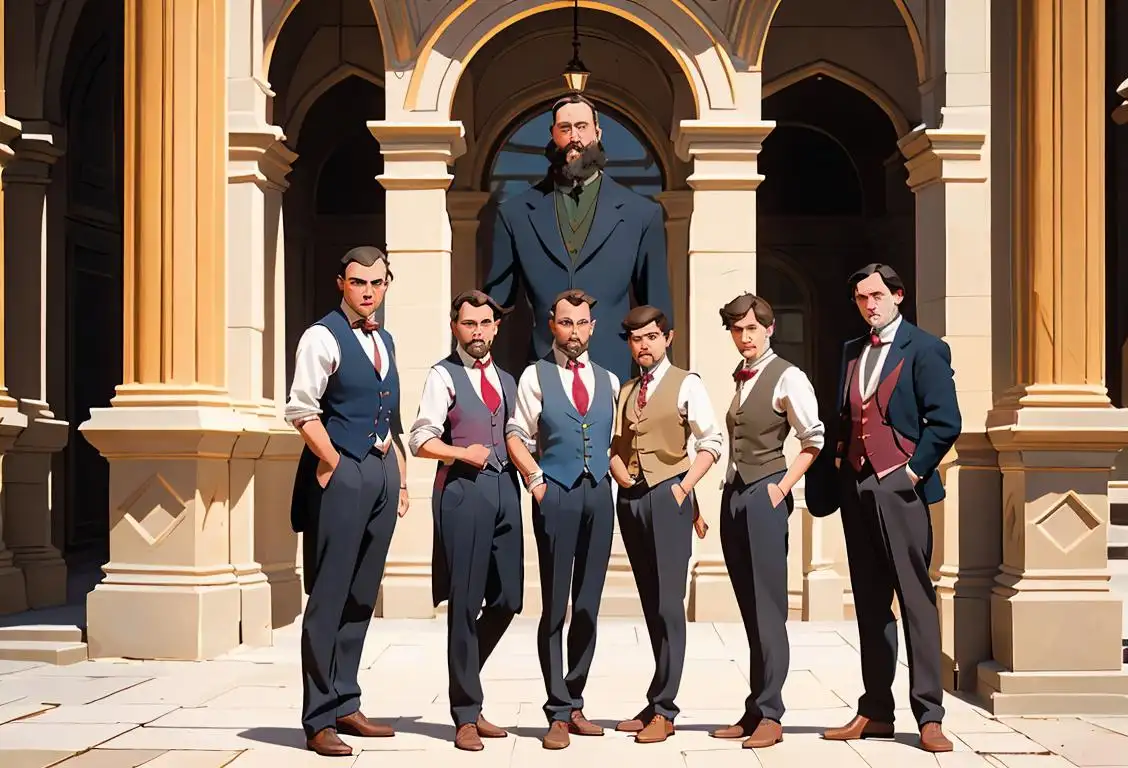National Pant Suit Day

Welcome to National Pant Suit Day, where we celebrate the fashion-forward power of classy ladies in suits! Get ready to rock that suit and turn heads like a boss. This day is all about confidence, style, and breaking those pesky societal fashion norms. So, get ready to embrace your inner fashion icon and let's dive into the fabulous history of National Pant Suit Day!
When is Pant Suit Day?
It's national pant suit day on the 8th November.
The Rise of the Pantsuit Phenomenon
For years, the world of fashion has been dominated by dresses and skirts as the go-to attire for women. But in the 1920s, a bold fashion revolution started brewing - women began wearing pants! While it initially sparked controversy, the sassy and practical pantsuit quickly gained popularity among trailblazing ladies.
Fast-forward to the 1960s and 1970s, when the world witnessed the emergence of power dressing. Enter the unforgettable and iconic duo: Yves Saint Laurent and Bianca Jagger. Saint Laurent, a brilliant fashion designer, unveiled his legendary Le Smoking tuxedo suit for women, inspiring a generation of women to suit up with confidence.
Then, in 2016, something truly astonishing happened. November 8th was declared as the official National Pant Suit Day, coinciding with the U.S. Presidential Election. It was a historic day when the first woman ever to be a major party's nominee for President, Hillary Clinton, delivered a powerful message in her pantsuit. The internet exploded with praise and admiration, and National Pant Suit Day was born.
Your Guide to Celebrating National Pant Suit Day
Ready to unleash your inner fashionista and join the ranks of fierce, pantsuit-clad individuals? Here are some delightful ways to celebrate:
- 1. Rock Your Pantsuit: Whether you prefer a classic black pantsuit or vibrant patterns, wear your favorite pantsuit proudly. Strut your stuff and show the world you mean business.
- 2. Host a Pantsuit Party: Gather your friends and throw a fabulous pantsuit-themed party. Encourage everyone to come dressed in their most stylish pantsuits and enjoy a night of fashion-forward fun.
- 3. Spread the Pantsuit Love: Take to social media and share your stunning pantsuit ensemble with the world. Use the hashtag #NationalPantSuitDay to join the conversation and inspire others to embrace this empowering fashion choice.
Did You Know?
Did you know that the term 'pantsuit' is believed to have originated in the early 20th century? It was first used to describe a tailored suit with trousers for women. So, the next time you rock a pantsuit, remember you're carrying on a fashionable legacy!
History behind the term 'Pant Suit'
1914
The Rise of the Pantsuit
The term 'pant suit' emerged in 1914 as a descriptor for a women's two-piece outfit consisting of trousers and a matching jacket. This new fashion trend signified a significant departure from the traditional attire, which primarily consisted of dresses and skirts. The pant suit offered women a more practical and comfortable alternative, reflecting the changing role of women in society and their growing desire for freedom and functionality in their clothing choices.
1966
The Power Suit Era Begins
The term 'pant suit' gained further prominence in the late 1960s, particularly during the feminist movement and the rise of female empowerment. As women increasingly entered the workforce and sought equality in professional settings, the pant suit became a symbol of strength, autonomy, and authority. It allowed women to break away from the sartorial constraints of traditional feminine attire and project a more assertive and confident image.
1972
The Pantsuit Revolutionizes Politics
In 1972, the pant suit took on political significance when American politician Shirley Chisholm made history as the first African American woman to seek a major party's nomination for President of the United States. Known for her iconic pantsuits, Chisholm challenged gender norms and shattered glass ceilings in the political arena, using the pant suit as a symbol of her strength, determination, and commitment to progressive change.
1980s
The Popularity Soars
During the 1980s, the pant suit experienced a surge in popularity, becoming a staple of many women's wardrobes. Influential figures like Princess Diana and prominent businesswomen embraced the pant suit, elevating it to a symbol of style and sophistication. This era saw various iterations of the pant suit, ranging from oversized shoulder pads and bold colors to more streamlined and tailored designs. The pant suit became synonymous with professionalism and contemporary fashion.
Present
The Evolution and Empowerment
Today, the pant suit continues to evolve and remains a powerful fashion statement. It has transcended societal boundaries and is not exclusive to any particular gender. Celebrities, politicians, and individuals from all walks of life wear pant suits to embody confidence, competence, and self-expression. The pant suit encapsulates the resilience and progress made by women in the pursuit of equal rights and opportunities while remaining a timeless symbol of empowerment and individuality.
Did you know?
Did you know that the term 'pantsuit' is believed to have originated in the early 20th century?Tagged
style fashion empowermentFirst identified
23rd October 2016Most mentioned on
8th November 2016Total mentions
15Other days
Pant Suit Day
Waistcoat Day
Tweed Day
Wear Brown Shoes Day
Bandanna Day
Bandana Day
White Shirt Day
Denim Day
Gucci Appreciation Day
Legwear Day








